American Amnesia
If you’re looking for answers to our most baffling political problems (How can so much wealth go to the top 1 percent without a massive uprising? Why is the U.S. paralyzed in combating global warming?), then grab this book before amnesia on these issues becomes even more acute.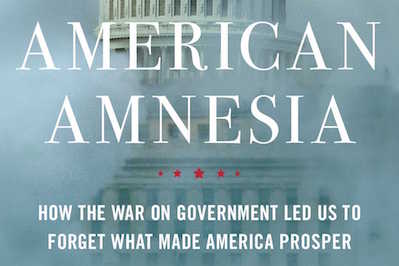 Simon & Schuster
Simon & Schuster
Simon & Schuster
| To see long excerpts from “American Amnesia” at Google Books, click here. |
“American Amnesia: How the War on Government Led Us to Forget What Made American Prosper” A book by Jacob S. Hacker and Paul Pierson
If you’re looking for answers to our country’s most baffling political problems (Why do the poorest states, which receive the most money from the federal government, still hate the Feds? How can so much wealth go to the top 1 percent without a massive uprising from the majority of Americans? Why is the U.S. paralyzed in combating global warming?), then grab a copy of “American Amnesia” and get a copy for a friend. Hurry—do it before amnesia on these and other pressing issues becomes even more acute.
In “American Amnesia,” Jacob S. Hacker, a professor of political science at Yale, and Paul Pierson, a professor of political science at Berkeley, have called a halt to the political and economic insanity that has been creeping up on us for the last three or four decades. No, that’s not quite right. What they’ve done is identify the forms of insanity that have taken root in the wake of our collective amnesia. There has been an erasing of the heritage of mixed economies that gave us such flourishing working and middle classes.
By mixed economies, Hacker and Pierson mean government working with business. We’ve had it in one form or another since the beginning of the United States of America. James Madison, often cited by conservatives as an enemy of government, asked rhetorically in the Federalist Papers, “What is the meaning of government? An institution to make people do their duty. A government leaving it to a man to do his duty, or not, as he pleases, would be a new species of government, or rather, not government at all.”
Government working with business is, the authors write, “the forgotten roots of our prosperity. … We have to dig deeply into the debris left behind by nearly a half century of ideological warfare to unearth the economic model. That … made us the richest nation the world has ever seen.”
Besides Madison, Hacker and Pierson find many allies in traditionally conservative bastions such as Adam Smith. As Smith clearly recognized, “the intermingling of markets and politics is inevitable: a private sector completely free of government influence is just as mythical (and undesirable) as a government completely free of private-sector influence.” Smith’s message was never that “government should get out of the way.” He was enthusiastic about government regulation “so long as it wasn’t simply a ruse to advantage one set of commercial interests over another.” [Authors’ emphasis.]
In a too-little cited passage from “The Wealth of Nations,” Smith wrote, “Regulation … in favor of the workman, is always just and equitable.” Every tax “is to the person who pays it a badge, not of slavery but of liberty.”
Misunderstood, misinterpreted theories from Smith and our founding fathers—Jefferson, the authors point out, never said “Government governs best which governs least”—have been used by the right wing to wage a war on federal authority while trying to change our perceptions of the past. In the late 19th century, far from wanting to eliminate the power of the federal government, “All the robber barons depended on government and their manipulation of it.” Railroad financiers Collis Huntington and Leland Stanford managed to see “higher purpose” in the bribery of politicians: “If you have to pay money to have the right things done [said Huntington] it is just and fair to do it.”
The South may lead the nation in detesting Washington, but “During and after the New Deal, the federal government invested massively and disproportionately in developing the South. There was rural electrification and highway building; new social programs with benefits that were scaled inversely to personal income; public health, worker safety and environmental efforts that had their greatest positive effects in the least developed regions.” Today, Mississippians (to pick just one state in the Deep South) get $2.34 in benefits back from the government for every dollar they paid in federal taxes. Where, one wonders, would Mississippi and the rest of the South be if the government really cut back on spending for them?
In a parallel example from our time, Steve Jobs “was well known for his disdain for government’s ineptness,” yet “he could never have created his pioneering products or made billions without the enormous reservoir of public investment and publicly trained talent that nurtured the innovation hub of Silicon Valley.”
The right has also made ceaseless war on unions, which “did more than any other organized force in American politics to address the concerns of less affluent citizens.”The unprecedented concentration of wealth among the few have built what sociologist Isaac Martin calls “a rich people’s movement,” which is why a vitriolic cover story in the Sept. 9, 2010, Forbes called President Obama “the most anti-business president … in American history.” Forbes has never apologized, even when the unemployment rate dropped below 5 percent. Hacker and Pierson identify the three key elements of the anti-government attack: “Christian conservatism, polarizing right-wing media, and growing efforts by business and the wealthy to back stop and bank roll Republican politics.”
Regarding Christian conservatism: “Because these voters generally care more about the party’s positions on abortion, gay marriage and other social issues than about its increasingly conservative economic stances, Republicans have had much greater freedom to head right on economic issues without worrying as much about the electoral support of their least well-off backers.”
The conservative media helps whip their people into line: “If you stray the slightest from the far right,” admits former Senate Majority Leader Trent Lott, “you get hit by the conservative media.” As the right wing pushed, Republican rhetoric becomes more inflammatory. As early as 1988, Newt Gingrich, in a speech to the Right Wing Heritage Foundation, called for “a civil war” with liberals: “This war has to be fought with a scale and a duration and a savagery that is only true of civil wars.” Later, Gingrich’s PAC sent out tapes to Republican candidates explaining how to “speak like Newt.” A Gingrich associate characterized the tapes as “all about how to demonize the opposition, how to use invective and scary language.” And, Democrats are the enemy of “normal [sic] Americans.”
Hangars full of Republican cash have fueled messaging experts like Frank Luntz who, among other things, has sent memos out to candidates on how to obfuscate on critical issues. Here’s one from 2002 on global warming: “Should the public come to believe the scientific issues are settled, their views about global warming will change accordingly. Therefore, you need to continue to make the lack of scientific certainty a primary issue in the debate. The scientific debate is closing [against us] but is not yet closed. There is still an opportunity to challenge the science.”
Remarkably, Hacker and Pierson write, “even as the scientific evidence accumulated over the next decade, Luntz and his allies would succeed in prying that window open.” That window has been pried open wide enough to raise the water levels around Miami about an inch a year.
“American Amnesia” is a brisk slap in the face for an America that has forgotten that the G.I. Bill helped this country take a dominant lead in college education, and that we have now fallen to 19th in college completion, as ranked by the Organization for Economic Co-operation and Development. Or that the U.S., which once had an infrastructure that was the envy of the world, now spends just 3 percent of its GDP on improving and maintaining it. China and India spend almost 10 percent. Or that this country, which a relatively short time ago was the most upwardly mobile in the world, now trails our neighbor to the north in opportunities for economic advancement.
As Hacker and Pierson put it, “The road to mass prosperity was paved by government … the forgotten partner in the dance of prosperity.” Forgotten, but not dead. Read “American Amnesia” now and start dispersing the cloud of forgetfulness.
Your support matters…Independent journalism is under threat and overshadowed by heavily funded mainstream media.
You can help level the playing field. Become a member.
Your tax-deductible contribution keeps us digging beneath the headlines to give you thought-provoking, investigative reporting and analysis that unearths what's really happening- without compromise.
Give today to support our courageous, independent journalists.
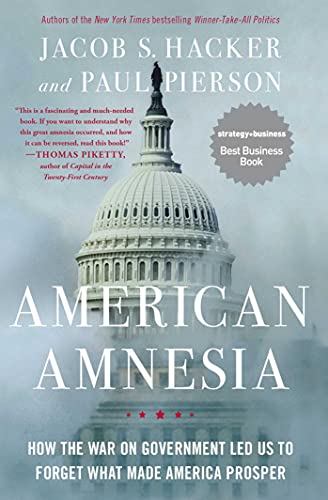

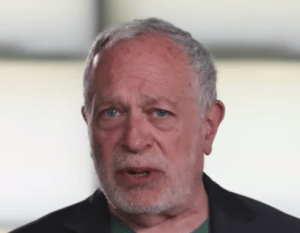

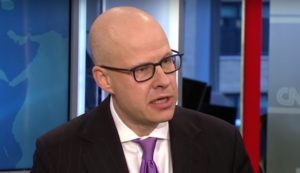

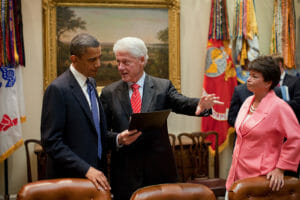
You need to be a supporter to comment.
There are currently no responses to this article.
Be the first to respond.